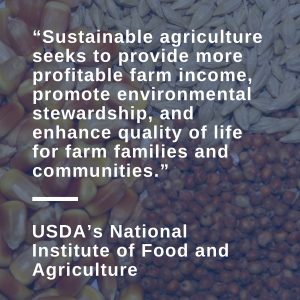U.S. Grains Commitment to Sustainability
Virtually all farms in the United States are family operations, many of which have been passed down through multiple generations. U.S. farmers raise their families on the land they farm, making protecting soil health and water quality even more important. As a result, farmers continually seek out new processes and technologies to preserve these precious natural resources.

Increasing production while lowering inputs per production unit and preserving natural resources demonstrates the sustainability of U.S. coarse grains operations. These improved efficiencies also contribute to sustained profitability of U.S. farms, ensuring operations and rural communities stay viable for current and future generations.
The U.S. Grains Council is committed to contributing to global climate efforts by working with its members and international stakeholders to address sustainability challenges in the food, feed, fuel and fiber international supply chains in which the products it represents participate.
The Council supports the climate goals established by member and sister organizations representing corn, sorghum and barley products, and will serve as a bridge and facilitator between national and international stakeholders to help achieve them.
The Council’s goal is to increase the volumes of sustainably-produced U.S. grains that reach international markets to support global food security and climate-smart international supply chains.
This webpage provides information and resources on the practices and technologies that contribute to the sustainability of U.S. farms and agribusinesses.
For additional answers or information, please contact the Council at grains@grains.org.

